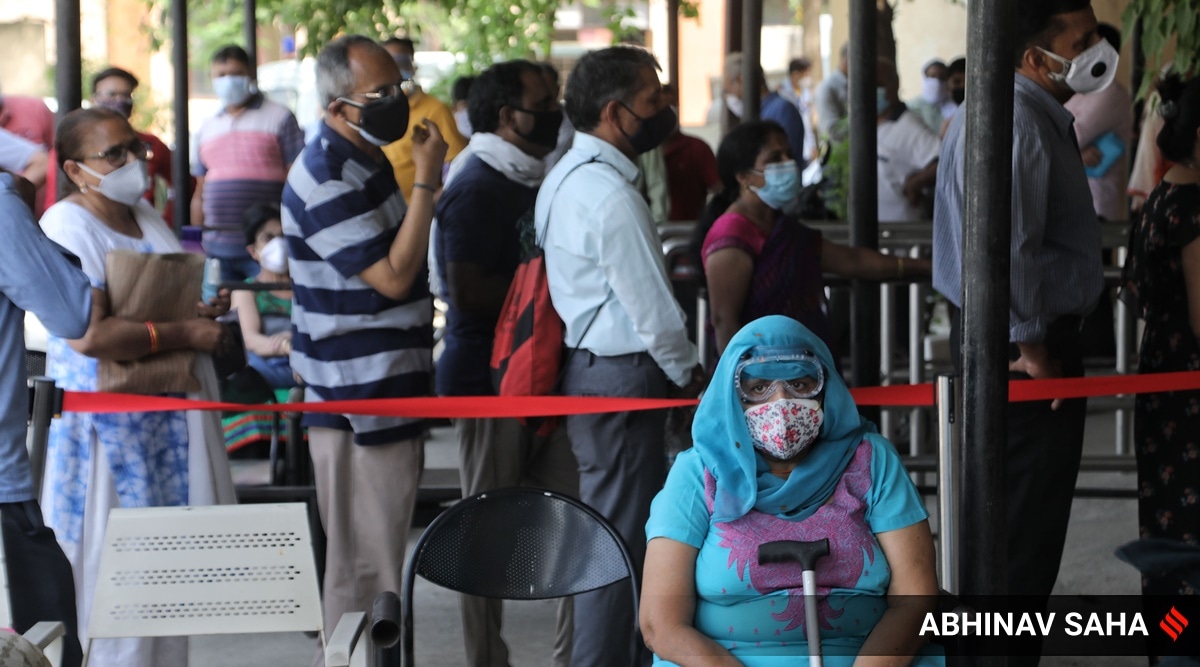 People line up for vaccination in Gurgaon's Sector 31 (Express photo by Abhinav Saha)
People line up for vaccination in Gurgaon's Sector 31 (Express photo by Abhinav Saha) In the wake of the second wave of Covid, our failure as a country to hold our government accountable is evident. Many voices from within the media acknowledged that a large section of the press had been too busy following the cues, distractions and narratives set by the government to question it on issues that really mattered. Civil society perhaps also needs to re-examine its role. Didn’t we too — as civil society members — fail in holding the government accountable?
India’s civil society has many actors — grassroots organisations that connect to the last mile and provide essential services; think tanks and academic institutions that churn out new policy ideas and generate evidence; advocacy organisations that amplify and build support for causes, and large impact funds and philanthropists who decide how these organisations get funded.
However, successive governments have been wary of this tribe and its energy. Both the UPA and the NDA governments have significantly curtailed the kind of activities that civil society actors can engage in. Philanthropists and donor organisations often find themselves unable to support initiatives that strengthen India’s democracy and its accountability mechanisms, for fear of retribution. Many civil society actors also focus on engaging with narrow policy problems to be able to measure impact and demonstrate quick “wins”, ignoring the fact that “small tweaks” can never fundamentally alter the way India is governed. By ignoring the politics around policy and focussing disproportionately on technocratic solutions, civil society has also missed the wood for the trees.
Today, it is easier to find money to fund a policy tweak than to fund a campaign to reform Parliament or the judiciary, because such a campaign is harder to measure and sustain and involves taking on the powerful. A report by McKinsey and Company estimated that close to 90 per cent of total donor interest in India was targeted towards primary education, primary healthcare, rural infrastructure and disaster relief, leaving areas such as human rights and governance with minimal funding.
Unfortunately, in the absence of a strong push from civil society, our democratic institutions have no intrinsic incentive to reform, with the result that in India’s gravest hour, we had no effective mechanism to hold a sitting government accountable. There was palpable helplessness in the judiciary, with judges having trouble in getting answers from the government. Even Parliament was unable to perform its oversight duty — it barely met in 2020 and a noticeably short monsoon session has been planned for 2021.
While those of us who study India’s democratic institutions have long been worried about the crumbling system of checks and balances in our democracy, the pandemic has put a spotlight on the issue. We need to re-examine parliamentary rules that are heavily tilted in favour of the sitting government, strengthen the hands of the judiciary, bolster federalism and the independent media, while creating transparency in decision making within the executive. Civil society has an important and irreplaceable role to play here.
A framework by the University of Pennsylvania’s Centre for High Impact Philanthropy suggests that philanthropists need to fund initiatives that empower citizens, build fair processes, call for responsive policy, strengthen information and communication networks, and bolster social cohesion. These are the forces that fundamentally shape a democracy. Civil society organisations too need to broaden their agenda to include issues that strengthen India’s institutions while collaborating to present a strong unified voice that demands more transparency and accountability in all areas and levels of policymaking. This involves taking more fights to the courts on transgressions by the government, building public opinion about expectations from a well-functioning democracy and creating tools and fora that help citizens engage with policymaking more readily.
Unfortunately, no matter how many small tweaks we make to policy, how many platforms we build to deliver citizen services and how much evidence we gather to solve specific developmental challenges, unless we preserve the political incentives to act in the interest of the people, we risk all our efforts coming to naught. To not see the strengthening of institutions and the deepening of checks and balances as important areas of work is our collective failure, one we must address immediately.
The writers are co-founders of Young Leaders for Active Citizenship
- The Indian Express website has been rated GREEN for its credibility and trustworthiness by Newsguard, a global service that rates news sources for their journalistic standards.

